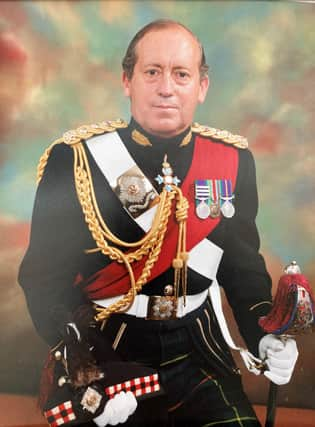Obituary: Brig Charles Ritchie CBE, Scots soldier whose life was like 007 film


The life of Charles Ritchie could have been a Bond movie – packed with escapades, from spying and cyanide poisoning to partying with David Bowie and fighting off a shark. As a career soldier serving worldwide he had more than his fair share of scrapes while dodging enemy fire, being thrown out of East Germany by the Russians and featuring on the IRA’s most-wanted list.
But as he told it, such daredevil episodes could occasionally be somewhat more prosaic and often self-deprecatingly funny. A brilliant raconteur, he committed his lighter-hearted army experiences to paper and, with impeccable timing, his manuscript for Laughter is the Best Weapon was delivered to his publishers just 48 hours before he died – a last act in a dramatic life that could have seen him on the stage rather than soldiering. Although there was a long military tradition in his family he had a teenage ambition to become an actor but, after being dissuaded, he joined the army and “spent the next 38 years acting my way through my military career in The Royal Scots”.
Advertisement
Hide AdAdvertisement
Hide AdThe elder son of Lt Col Bill and Iris Ritchie, he was educated at a Hampshire prep school and Berkshire’s Wellington College before attending the Royal Military Academy, Sandhurst. There he took part in the last duel to be fought at the elite establishment. Following his father into the Royal Scots (The Royal Regiment), he was posted to the 1st Battalion in Libya in 1962, seeing active service in Aden and in Yemen against dissidents in the Radfan, with his battalion and as a forward air controller with the Federal Regular Army.
Not long after arriving in Libya he suffered cyanide poisoning – self-inflicted – after consuming a “nasty bunch of grapes”. Farmers routinely sprayed them with a hydrogen cyanide pesticide but he missed warning signs to wash them before eating. Had he not been spotted by a friend and whisked to hospital, he would likely have died.
He was prematurely reported dead in the Radfan after a flash burn, to clear a property of bugs, went badly wrong. The unexpectedly large blast seared all the exposed skin from his face and arms. He was given the last rites and a letter of condolence posted, but made a miraculous recovery before his parents could receive news of his demise. He also survived a helicopter crash in the 1960s. And then there was an uncomfortable encounter during winter warfare training in Arctic Canada when a timber wolf entered his ten-man tent. Ritchie, on watch, shot it through the head.
After the Yemen he spent two years in Australia as Aide-De-Camp to the state governor of Victoria – during which time he enjoyed a whisky-tasting session with Lyndon B Johnson – followed by various postings across Europe. He returned to Sandhurst as a captain instructor for a time and, after further regimental service, was appointed operations officer with the British Commanders-in-Chief Mission to the Soviet Forces in Germany (BRIXMIS), based in Potsdam, East Germany. There, he writes, he was engaged in “convincing the Soviets that I was a harmless character whilst covertly spying for my country” and recalled partying with David Bowie. Utilising his language skills and personal charm, he defused difficult and often dangerous situations, though it took several inches of armour plating to protect him when his vehicle was allegedly deliberately run over by a Russian eight-wheeled missile launcher.
He was ejected from East Germany after being captured by Russian Special Forces while attempting to flee during a mission to photograph Russian military equipment – but not before his Russian counterparts held a farewell party for “the mad Scotsman”. Returning home he was made an MBE and promoted to lieutenant colonel.
He then commanded 3rd Battalion The Ulster Defence Regiment in County Down and was elevated to OBE. After a tour as an instructor at the Joint Services Staff College at Greenwich, during which time he married Araminta Luard, he went on promotion to colonel to the Ministry of Defence as the assistant director of Military Assistance Overseas, establishing a military staff college in Zimbabwe for President Robert Mugabe, nearly drowning in a riptide on the Ghanaian coast and fighting off a shark in Belize.
Promoted to brigadier in 1988, Ritchie returned to Ulster to command the UDR, at an increasingly difficult time for the regiment, and was made a CBE. He then served as the UK’s national military representative at Supreme Headquarters Allied Powers Europe in Belgium before becoming chief of staff to the French General Jean Cot in the UN Protection Force in former Yugoslavia.
His last posting was as military attaché at the British Embassy in Paris where Diana, Princess of Wales, died in a road crash the week before he retired. Heavily involved in the repatriation arrangements, he controversially broke protocol by draping her coffin with the Royal Standard, not the Union Flag, saying he went with his heart, not his head.
Advertisement
Hide AdAdvertisement
Hide AdColonel of his Regiment from 1990-1995, an Aide-de-Camp to HM The Queen and a member of her Bodyguard for Scotland (Royal Company of Archers), after retiring to the family home near Edinburgh he worked as business development director for a Canadian soya firm before becoming secretary of Edinburgh’s New Club. A former director of the Edinburgh (now Royal) Military Tattoo, in his final year he was asked what he would like as a parting gift. As honorary president of the West Linton and District Pipe Band he asked that they open the Tattoo one night – a request granted and still talked about in the village today.
Ritchie, who said he had “a charmed and lucky career on life’s stage”, is survived by his wife Araminta and son Paul.